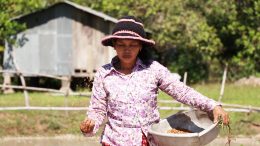
Kampong Chhnang, Cambodia – Kraing Leav Commune, Rolea Pa’ear District, Kampong Chhnang has an unfortunate farmer history under the French Colonial in 1925 during the uprising against Resident Badez due to the oppression of farmers for their inability to pay tax on paddy fields. To this day, residents of Kraing Leav District depend mainly on paddy rice farming for a living. The farming practices vary from one family to another. Some families can have enough yield for their own consumption, while others lack supplies for six months due to their sole dependence on rain for their farms.
On 15 September 2012, Kraing Leav Agricultural Cooperative was created and registered officially by Kampong Chhnang Agricultural Department with 97 members of whom 61 were female and with a total capital of KHR 10 million (Cambodian riels) (USD 2,418) with a par value of KHR 20,000 (USD 5) per share. As of June 2019, the number of members of the cooperative increased to 232 (81 are female) with a total of 847 shares at KHR 38,800,000 (USD 9,383).
The initial objective of the cooperative is to (1) help provide loans to farmers in their farming with a joint share investment (one share is KHR 20,000), and; (2) produce organic paddy for domestic supplies and overseas export.
Through the cooperative, members received training on agricultural techniques, specifically on the production of organic paddy, from a number of organizations including the Farmer and Nature Net (FNN) through the AFOSP-MTCP2 Programme, and Neang Kangrei Organization through PIN and Kampong Chhnang Agricultural Department.
“To achieve the organic paddy production target, Kraing Leav Agricultural Committee established production groups. We selected 40 volunteer families to produce this organic paddy for the community. They are provided with good quality paddy seedlings and then buy back the paddy yield from them,” Mao Sarim, Chairperson of the Cooperative Board, explains.
Chim Soky, the community committee in charge of training and a member of organic paddy production, says, “Before joining the cooperative, I also did organic paddy farming but it didn’t provide much yield. Before, two hectares of land yielded only 4 tons, but now it has increased to 6 tons. I can sell the paddy to the cooperative at a higher price than that offered by middlemen. When the cooperative buys paddy from me and sells it for profits, I also gain from the profits through dividends.”
She adds, “Joint investment with a cooperative is better than sole investment because we have the chairperson, treasury, committee in charge of each area, we have members and we can get the information from the outside markets so the middlemen cannot price down our paddy.”
Aside from selling white and red Phka Rumduol Angkor rice, the cooperative also sells wet paddy to Amru Rice Cambodia Co., Ltd, a rice processing company, for exporting. The company needs around 23 tons per year, but the quantity of rice produced by the cooperative is well below this. Right now, the cooperative is enhancing the quality of organic paddy productivity to supply as much as 50 tons per year to meet the demand of Amru Rice.
“Prior to placing the purchase order from Amru Rice, the company will do a site visit at the rice field and bring the paddy for laboratory tests to ensure that the paddy is produced organically. Thus, the cooperative, through its committee, checks the technical specification of each member,” explains Chairperson Mao.

Furthermore, to increase employment in the cooperative, the community committee installed a rice mill machine worth USD 20,000 through a loan from the Rural Development Bank with the aim of supplying organic rice to a number of supermarkets in Phnom and selling it within the province and the community itself.
“Selling the paddy is one source of income, but because of the rice milling machine, we generate rice bran or rice residuals that we can sell for KHR 5,000,000 to 6,000,000 (USD 1,209 – 1,451),” shares Khim Sokunthea, treasurer of the cooperative.
Amid their success, the cooperative also faces challenges such as the lack of paddy dryers as the community depends on solar drying. At times, they experience a loss due to the unavailability of sunshine to dry their paddy resulting in spoiled paddy. Nevertheless, the community committee has made efforts to mill spoiled paddy and sell these at much lesser prices and supply them to animal feed processing companies to ensure minimal loss for their members.
Kraing Leav Agricultural Cooperative is an outstanding cooperative in Kampong Chhnang in terms of organic paddy and rice production. The cooperative is planning to expand cultivating land and production members in order to ensure sufficient supplies at the demands of communes. #
About AFOSP-MTCP2
AFOSP-MTCP2 is a capacity building program funded by the European Union (EU) with co-financing from the International Fund for Agricultural Development (IFAD) and the Swiss Agency for Development and Cooperation (SDC). The program is being implemented in seven ASEAN countries through the consortium Asian Farmers’ Association for Sustainable Rural Development (AFA) and La Via Campesina (LVC). AFOSP-MTCP2 supports the strengthening of national farmers’ organizations (FOs) and their national platform towards improving their institutional capacity to deliver economic services to their members as well as to effectively engage them in policy processes. At the ASEAN level, the consortium AFA – LVC works in partnership with the ASEAN Foundation in expanding the spaces for the engagement of FOs in ASEAN processes.

Comments are closed